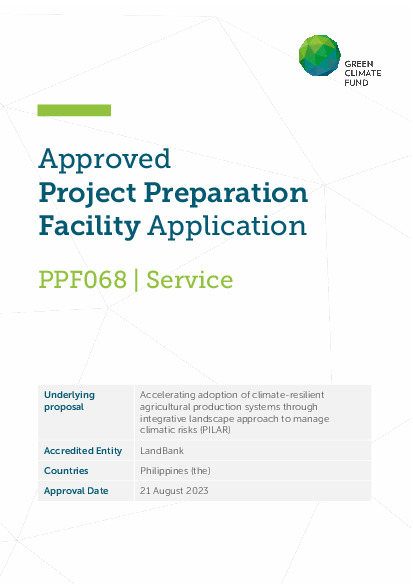Accelerating adoption of climate-resilient agricultural production systems through integrative landscape approach to manage climatic risks (PILAR)

Accelerating adoption of climate-resilient agricultural production systems through integrative landscape approach to manage climatic risks (PILAR)
The Philippines ranks fourth in terms of long-term Climate Risk Index (CRI) using historical data from 2000-2019, registering the highest number of extreme climatic events with estimated losses at US$3.2Billion PPP ‒ equivalent to half of the country’s GDP1. It is projected that the country will continue to face severe typhoons and drought in the years to come. PILAR aims to build the resilience of agriculture landscapes in the Philippines by addressing the financial and technical barriers to scaling climate resilient agriculture (CRA) and identifying transformational livelihood pathways for approximately 3.5 million people. CRA reflects an ambition to improve the integration of agriculture development and climate responsiveness. PILAR will also catalyze a transformational shift within the LANDBANK’s ability to invest in CRA in the Philippines. It will focus its interventions in the three important river basins in Pampanga, Bicol and Agusan.
The project concept note was submitted to GCF in December 2020 and after several iterations, it was endorsed by the GCF Investment Committee for PPF application on 17 September 2021. The activities proposed here will directly feed into the funding proposal that will be submitted to GCF by the end of 2023.
The PILAR team met with FAO and discussed potential complementation of the FAO’s proposal to GCF, Adapting Philippine Agriculture to Climate Change (APA). Proponents of both proposals see that complementation can be in terms of investment planning and financial package development (Outcome 1), CRA enterprise financing (Outcome 2), and capacity building and information sharing (Outcome 3). Bicol is the common area of APA and PILAR and a closer collaboration will be fostered in planning, monitoring and learning. See Annex 2 for more details.
The development of PILAR’s concept note is strongly anchored on multi-stakeholder engagement. It is supported by existing secondary data from the national government, particularly the Department of Agriculture’s Adaptation and Mitigation Initiative in Agriculture (AMIA) program, as well as information from ongoing and previously completed projects of Landbank, International Rice Research Institute (IRRI), and World Agroforestry Center (ICRAF). The PPF activities requested are designed to strengthen PILAR’s proposal in two areas: 1) inclusion of primary data including baseline information and targets; and 2) involvement of local stakeholders based in the three target river basins.